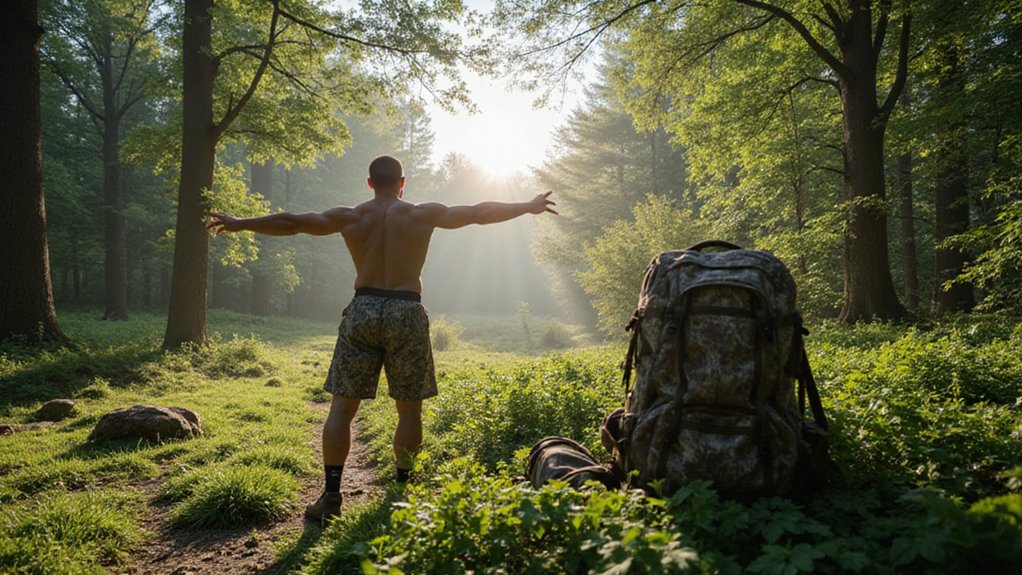When it comes to hunting, your physical fitness can make all the difference. It’s not just about being strong; endurance, flexibility, and nutrition play vital roles too. By focusing on these aspects, you can enhance your overall performance and enjoyment during each hunt. But what specific strategies should you implement to build this well-rounded fitness? Let’s explore the essential components that can elevate your hunting experience.
What is Hunting Fitness and Why is it Important?
Hunting fitness is all about preparing your body for the demands of the hunt, and it’s essential for ensuring a successful outing.
When you’re physically fit, you can navigate tough terrain, carry gear, and stay alert longer. Your strength, stamina, and flexibility play critical roles in your performance, allowing you to react quickly and effectively.
Plus, good fitness reduces the risk of injury and fatigue, keeping you in the field longer. It’s not just about the thrill of the chase; it’s about enjoying the experience and making the most of each moment.
Invest in your fitness to enhance every hunt.
How to Build Endurance for Long Hunts
To tackle long hunts effectively, building endurance is essential for maintaining your energy and focus.
Start by incorporating cardio workouts into your routine, like running, cycling, or hiking. Aim for at least 30 minutes of moderate to intense activity, three to five times a week.
Mix in interval training to boost your stamina and get used to varying paces. Don’t forget to include longer, slower hikes with a weighted backpack to simulate hunting conditions.
Hydration and proper nutrition are critical too; fuel your body with balanced meals.
Finally, rest and recovery are imperative—allow your body time to adapt and grow stronger.
What Strength Training Exercises are Best for Hunters?
Building endurance is just one part of preparing for a successful hunt; strength training also plays an essential role in your performance.
To enhance your strength, focus on these effective exercises:
- Deadlifts – Build overall strength, targeting your legs and back.
- Squats – Strengthen your lower body for better stability while walking or climbing.
- Bench Press – Develop upper body strength for lifting and carrying gear.
- Pull-Ups – Improve your upper body and grip strength, vital for handling equipment.
Incorporating these exercises into your routine can greatly boost your hunting capabilities.
How Can Flexibility Improve Your Hunting Performance?
How can flexibility enhance your hunting performance?
Improved flexibility allows you to maneuver easily in challenging terrains, helping you reach that perfect vantage point.
When you’re more flexible, you can draw your bow or aim your rifle with greater range of motion, reducing the risk of injury.
Flexibility also aids in quicker recovery after long hikes or strenuous activities, keeping you focused and alert.
Plus, stretching before and after a hunt can prevent stiffness, ensuring you stay agile throughout the day.
Incorporating flexibility training into your routine can make a significant difference in your overall hunting effectiveness and endurance.
What Nutritional Tips Support Hunting Fitness?
Flexibility plays a key role in your hunting performance, but proper nutrition fuels your body for the demands of the hunt.
To enhance your hunting fitness, focus on these nutritional tips:
- Hydrate: Drink plenty of water to stay alert and maintain stamina.
- Fuel Up: Eat complex carbs like whole grains for sustained energy.
- Protein Power: Incorporate lean proteins, such as chicken or fish, to support muscle recovery.
- Healthy Fats: Include sources like avocados and nuts for essential nutrients and energy.
How to Create a Hunting Fitness Training Plan
While a well-rounded fitness routine is essential for any hunter, creating a tailored training plan can considerably enhance your performance in the field.
Start by evaluating your current fitness level and specific hunting needs. Incorporate strength training, focusing on core and leg muscles, to improve endurance and stability. Add cardiovascular exercises to boost stamina for long treks.
Don’t forget flexibility; incorporating yoga or stretching will help prevent injuries. Set clear, achievable goals, and schedule workouts at least three times a week.
Finally, track your progress and adjust your plan as needed to guarantee continuous improvement and readiness for the hunting season.
What Role Does Mental Fitness Play in Successful Hunting?
Mental fitness is just as essential to successful hunting as physical preparation, as it directly influences your focus, decision-making, and resilience in the field.
To sharpen your mental game, consider these strategies:
- Visualization: Picture your success before the hunt, envisioning every detail.
- Mindfulness: Practice staying present, enhancing your awareness of surroundings.
- Stress Management: Develop techniques like deep breathing to stay calm under pressure.
- Positive Self-Talk: Encourage yourself with affirmations, boosting confidence and morale.
How to Stay Motivated in Your Hunting Fitness Journey
Staying motivated in your hunting fitness journey can be just as challenging as building the physical skills needed for the field.
Set clear, achievable goals that excite you and track your progress to celebrate small wins.
Find a workout buddy who shares your passion; supporting each other keeps you accountable.
Vary your routine to keep things fresh—mix in strength training, cardio, and outdoor activities to mimic hunting conditions.
Visualize your success in the field; remind yourself why you started this journey.
Finally, embrace the process—enjoy the growth and the challenges; they’re all part of becoming a better hunter.
